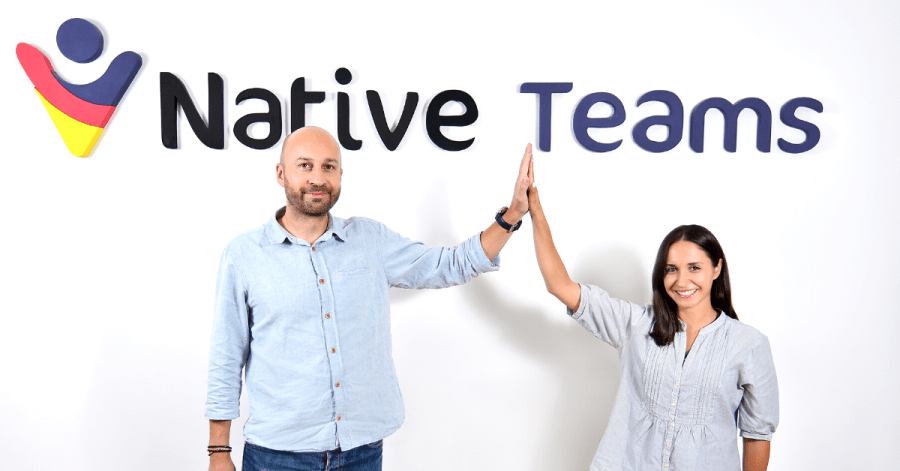- London-based, North Macedonia-rooted fintech company Native Teams has raised €2M from investors led by the Bulgarian Eleven Ventures, making it one of the largest seed rounds for a tech startup from North Macedonia.
- Other investors included Croatia-based fund Fil Rouge Capital, UK-based Haatch Ventures, and US-based fund Quake Capital.
- Offering its services in more than 30 countries, Native Teams will use the funds for further global expansion. The resources have already helped the startup launch in Nigeria as its first outside of Europe destination, and are soon expected to go towards opening its first location in South America.
“We created Native Teams to provide a way for employees and freelancers to work for the best companies in the world, but without having to relocate in order to have ‘proper’ employment. We are delighted to have raised our Seed round from the best regional funds that represent where we are from, as well as a wider range of investors who will aid our global expansion.”
Jack Thorogood, Native Teams Co-Founder and CEO
Following the emerging trend of hybrid and remote work, Native Teams helps freelancers and remote employees manage their work payments, while staying compliant with local laws. Through delivering the combination of a multi-currency wallet and a Visa card, along with ‘employer of record’ services and tax management, the platform helps users receive fundamental work benefits such as access to healthcare, pension plans, and basic tax compliance. The company also assists with easy access to visa requirements, work permits, and travel documentation in Europe and beyond, and is known as the world’s first ’Employment-as-a-Service’ platform providing users with employment options in their home countries.
The main goal for the newest investment is to continue pursuing the company’s fast-growth trajectory, specifically localizing its remote payment services into more markets prior to a full global rollout in 2023.
“Jack and Alex are taking on a booming industry with an ambitious strategy under the belt. Native Teams solves a major pain for international workers, freelancers and the companies employing them, as the future of work transformation further accelerates. The partnership between Native Teams and Eleven has been very fruitful so far and we are excited about the road ahead.”
Daniel Tomov, Managing Partner at Eleven Ventures, one of the leading early-stage VCs in Southeast Europe.
How Native Teams Was Born
The startup was launched in July 2021 by Jack Thorogood (CEO) and Aleksandra Mitrevska (COO). As remote workers themselves, the founders saw the need for the tools that would make their remote work easier. Since then, the company grew rapidly, marking 10x revenue growth in the first half of 2022 compared to the ending of 2021.
Native Team offers a plan-based approach to contractors, remote workers, their employers and clients based on individual needs. Some of the features include sending or requesting payments (for contractors), looking for employed status and client payments services (for remoters), paying international freelancers and flexible workers (for clients), and managing employment and payments to employees (for employers).
Having employees in around 19 countries, on a local level, the main representative office of the region is located in Skopje, with a team of around 70 employees from North Macedonia, Serbia, Bulgaria, Albania, Croatia, etc.
The Recursive has talked to one of the Native Teams’ founders, Jack Thorogood, to get to know the product and founders’ intentions towards the SEE market.
The Recursive: What was your journey as a remote worker yourself and how did it lead you to helping out other freelancers?
Jack Thorogood, Co-Founder and CEO of Native Teams: We had quite a variety of experiences as remote workers amongst our founding team. I used to do freelance IT project management for a Swedish company while being based in the UK. My co-founder Alex and I started working together as I began to take on bigger projects with that consultancy company, for some additional clients.
After a couple of years of working together, we happened to have a conversation about work benefits and payments and there was a massive realization on my part that both of us were struggling in this field. It was a headache for me to get paid by the Swedish company and some Australian clients, while for Alex it was impossible to get paid in her local currency, Macedonian denars, and without proper local employment, she didn’t qualify for basic state benefits, such as health coverage.
We set about setting up the local company we needed to employ her properly, and soon afterward we did the same in Serbia to help the designer who was working with us at the time. We soon realized that others in our positions encounter the same problems.
Coming up with Native Teams was a way for us to let freelancers and remote workers like us pursue the best opportunities in the world, but be employed locally where they want to live, without having to worry about all the payments and compliance complexities.
How does the solution benefit employers and clients?
We focus on employees first and foremost, but this often then opens a door for a direct relationship with employers as well. After agreeing to pay an employee through Native Teams, employers often think of getting other employees involved in the same way.
In terms of why we work well for employers, I’d say that there are two main reasons.
Firstly, it means that they can hire anyone on the same terms as a local employer in any of our supported countries. This gives them much better access to talent.
Secondly, we can provide a single cost for each employee that an employer has. They get one fixed cost, and we take care of everything in the background. This is also empowering for the employee as they get more discretion in terms of how they receive that remuneration.
What are currently the most popular Native Teams features among its users?
At the heart of Native Teams is our multi-currency wallet. This is essential for all users, as it is where the money comes in and flows out of. Our Visa cards are also a popular product, offering some additional flexibility when it comes to helping users access their money.
A newer feature – but an area where we are seeing quite a bit of demand – is our employee benefits platform. This allows freelancers to access premium, tax-efficient ’employee benefits’ of the type that they might get working for a big multinational company (for example private health insurance), but made available to them as individuals. This also ties in well with our longer-term goal of making remuneration more than just ‘cash in the bank’, but instead a combination of cash, card spending, and benefits.
What market opportunities for such a solution do you see in Southeast Europe?
We see a really strong period of growth ahead of us in the SEE region. Since we launched, we’ve seen that the longer we are in a country, the more success and faster growth we have. We launched in North Macedonia and Serbia, and the two continue to be strong countries for us with ever more exciting opportunities in them each day. Of course, we have global ambitions – we are currently present in 35 countries, and have just stepped outside of Europe for the first time – but the SEE is where we are based and where we see a strong period of growth ahead.
Our goal is for every employee to ultimately be paid via a platform, such as Native Teams. It is so much more empowering for employees and simple for employers, so really we are just getting started even in our most mature markets.








